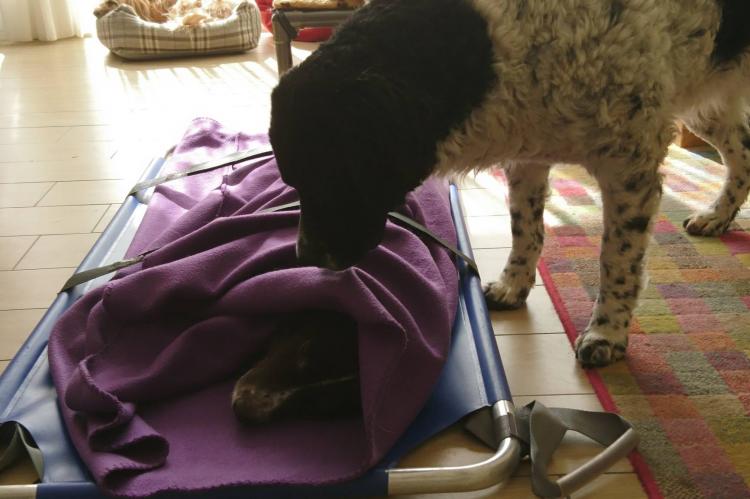Parasite kills 9 month old puppy
People sometimes tend to think lightly on deworming, but it deserves more attention. The sad story of Loulou proves this point. Her owner gave us the permission to share her story.
“9th of July: Loulou Leia (Frisian Water Dog) would’ve been 1 year old today. Unfortunately she died on the 26th of April from internal bleedings. Dissection showed that her coagulation value dropped to a fatal level after a French heartworm infection. Outbreaks were found in Almere, the Veluwe and the dunes of The Hague. The vet had not seen this before in 20 years. Loulou did not cough at all. The only signal we could’ve noticed was a delayed clotting time in previous wounds. Please be alarmed for this, especially with dogs under a year old. They seem to be more prone to coagulation problems. The current effective deworming product available is based on milbemycine (Milbemax). The larvae of this French heartworm are not visible in the dog’s faeces.
Loulou had a hypodermic bleeding back in February, which lasted for a couple of days. A month later she had a cut in her tongue which would not stop bleeding. Because there is still a lot unknown about coagulation problems with this infection, the vet did not recognize the symptom as a heart worm infection. Looking back at it, these were the first signs of her fatal disease.
On the 24th of April Loulou seemed a bit sore in her hindquarters. She had been playing with other dogs the day before, which seemed to be the cause of the stiffness. The vet prescribed some painkillers, but from that point on her situation just became worse. In the evening, there was a bleeding visible behind her eye. She was taken to the vet once more but her symptoms could not be diagnosed. Loulou was stiff, uncoordinated and was showing pain in her back. Her orientation seemed to decrease quickly. The symptoms became worse the next day, and Loulou was having trouble keeping her balance. A strange fact is that she was still happily eating her meals, but her senses seemed to become affected as well. By the end of the afternoon she had several short but severe seizures. She did not respond to her name anymore and her condition just got worse during the night.
The next morning she had lost her sight and could not stand up anymore. The vet still had no clue what was going on with her. Only one and a half day after the very first symptoms Loulou was in such a bad condition that it was clear she would not recover from this. Loulou was put to sleep while she was at home, lying on the sofa. Her body was offered to the veterinary University of Utrecht for investigation, where a severe infection of Angiostrongylus vasorum was discovered, also known as French heartworm. A large amount of larvae were found, which had not reached their adult stage yet. It is still unclear how this puppy could’ve become infected so badly. The cause of death for Loulou was the abnormal coagulation time in her blood caused by a nearly completely lack of coagulation value."
Angiostrongylus vasorum or French heartworm is a threadworm that lives in the heart and lung vessels of canine animals. Infections take place when a dog eats an infected snail, which is the intermediate host for this heartworm.
While the name refers to France as a risky area, there are more and more reports of Angiostrongylus vasorum infections in the Netherlands and neighboring countries. The symptoms include respiratory and neurological problems, bleeding disorders, gastro-intestinal problems and weight loss. Blood disorders such as eosinophilia, regenerative anemia and thrombocytopenia, sometimes combined with abnormal clotting times, can also occur.
An infection can be diagnosed with the help of x-rays, an ultrasound, MRI or a CT-scan. For definitive diagnoses, a vet will have to investigate cerebrospinal fluid, do a bronchoalveolar lavage or investigate the feces through the Baermann method. Unfortunately the Baermann method can give false negative results, so further investigation is recommended. The heart worm can be treated with ant parasitic products along with treating the symptoms with the right medication and therapy. The name of this parasite is misleading, the French heart worm can also be caught in the Netherlands and neighboring countries.
Areas where the Angiostrongylus vasorum has been reported in the Netherlands are “de Veluwe”, southwestern parts of Flevoland and around The Hague. This does not mean the heartworm is only found in these places, it is possible that it found a place in other areas in the country as well. This makes it important for all dog owners in the country to be aware of this risk. The only deworming product that is effective against this heartworm are those based on milbemyxine. It’s commonly sold under the product name Milbemax. If you suspect a heartworm infection in your dog, make sure to contact your vet about this. Please be aware as this can be a fatal disease for dogs if left untreated!






